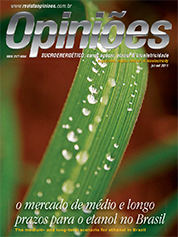Adézio José Marques
President of Ceise-Br
Op-AA-29
Resumption of the sugarcane-based energy industry
Beginning in 2003, when the first flex-fuel vehicle was launched, the accelerated growth in demand for this kind of vehicle was the major factor for the expansion of sugarcane production. In 2010, the automobile industry reached the production mark of 12 million vehicles. This is a positive scenario, in which the industry grew at an average annual rate of 10%, making it an interesting investment option.
The crisis in 2008 made the industry reduce the rate and speed of investments to expand production capacity, which, in combination with climate problems that impacted the last two harvests, reduced the industry’s growth to an average of 3.3% per year.
Due to the crisis, many industrial companies were restructured, thereby managing to recover. Having overcome the crisis, the sugarcane-based energy industry was back on the growth path, becoming a world reference for ethanol produced from sugarcane.
However, the challenges are still plentiful, such as to increase the crushing capacity, attract national and foreign investment, renew sugarcane plantations, improve logistics, and more importantly, build new mills.
According to Unica data, Brazil needs new mills to guarantee the supply of ethanol until 2020, increasing production from 640 million tons of sugarcane to 960 million tons. In addition, the sugarcane-based energy industry’s potential is still not fully utilized for the generation of bioenergy, given that only 20% of the mills co-generate energy from bagasse in the country.
However, to reach the goals set for 2020, both in the production of sugar and renewable energy, the country urgently needs public and private policies to leverage this industry’s growth. One estimates that it is necessary to invest about R$ 80 billion to build additional 150 sugarcane mills until 2020.
Recently, president Dilma Rousseff in Ribeirão Preto launched the 2011 Agriculture and Cattle Raising Plan. The planned initiatives seek to expand sugarcane plantations through credit lines for their renewal, with the objective of meeting the growing demand for ethanol due to the growth of the flex-fuel car market, and to bring about fuel price stability.
With the objective of seeking new initiatives for the industry, Ceise-Br created Technical and Industry-specific Committees, the embryo of the Sugarcane-based Energy Industry’s Center of Competitive Intelligence.
Comprised of the most renowned professors and market professionals, each such committee will be responsible for analyzing and suggesting effective measures in the various areas of this industry, which will subsequently be sent to the Federal Government for analysis and appropriate action.
With the bill proposed by the American Senate last June, to eliminate subsidies and tariffs, Brazilian ethanol will become more competitive and will allow envisioning large export volumes to that country.
There is a demand for 58 billion liters of ethanol in 2012, of which 7.5 billion represent advanced technology fuels (currently, sugarcane ethanol is the only one complying with regulatory requirements). In this context, the New Biofuels Committee that advises Ceise-Br’s executive board is alert to what goes on in terms of research and development of second and third generation biofuels.
Other major challenges about to be faced consist of efficient sustainable growth and the increased professionalization and qualification of the industry’s labor force. Among our members we have detected a need for qualifying managers in this industry.
Therefore, in partnership with Unica and Orplana, at the end of 2010, we launched UniCeise (the Sugarcane-based Industry’s Corporate University), for the purpose of filling a gap in managerial qualification for activity in companies that comprise this industry’s production chain. UniCeise is an important step for innovation in the industry, which is in a transition period, requiring of its professionals broad knowledge in several areas.
Furthermore, with the growing demand for ethanol in both the domestic and foreign markets, we face the need to allocate qualified professionals to the units expanding their production, as well as to new greenfield projects. Short duration courses, technical and professional operational courses, university-level courses, graduate courses, among others, are always a differential in hiring, in combination with the experience needed to perform in a given job.




